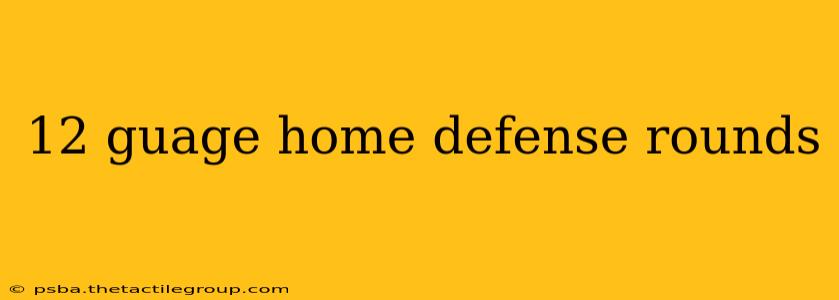Choosing the right ammunition for home defense is a critical decision, and for 12-gauge shotgun owners, the options can seem overwhelming. This guide will delve into the key considerations when selecting 12 gauge home defense rounds, helping you make an informed choice that prioritizes safety and effectiveness.
Understanding the Importance of Ammunition Selection
While the stopping power of a 12-gauge shotgun is undeniable, the type of ammunition you choose significantly impacts its effectiveness and potential for collateral damage. The wrong choice can have serious consequences, underscoring the need for careful consideration. Factors like projectile type, shot size, and payload greatly influence the round's performance within the confines of a home.
Key Considerations for 12 Gauge Home Defense Rounds
Several factors should guide your selection process:
1. Projectile Type: Buckshot vs. Slugs vs. Birdshot
-
Buckshot: This is generally the preferred choice for home defense. Buckshot rounds contain multiple pellets (typically 00, 000, or even larger) that spread upon exiting the barrel, increasing the likelihood of hitting a target at close range. The larger the number preceding the "0" (e.g., 000 buck is larger than 00 buck), the larger the pellets. Larger pellets offer greater stopping power but have a tighter pattern, potentially reducing effective range.
-
Slugs: These are single projectiles, effectively a large bullet. Slugs offer superior penetration but with a much narrower pattern than buckshot. They are suitable if you're concerned about threats beyond the immediate vicinity of your home, but carry a greater risk of overpenetration, a significant concern in a home environment.
-
Birdshot: While inexpensive and readily available, birdshot is not recommended for home defense. Its small pellets lack sufficient stopping power and are unlikely to incapacitate a threat effectively. The risk of overpenetration is also lower with birdshot than slugs, but not sufficiently lower than buckshot to make this a preferred home defense choice.
2. Payload and Pattern
The number of pellets in a buckshot round and how tightly they group (pattern) are crucial. A tighter pattern is more accurate at longer ranges, but in close-quarters home defense, a slightly wider pattern might be preferable to ensure a hit. Over-penetration remains a significant concern, regardless of pattern.
3. Reduced Recoil Options
The powerful recoil of a 12-gauge shotgun can be challenging for some users, potentially affecting accuracy and follow-up shots. Reduced recoil ammunition is specifically designed to lessen recoil, improving control and making rapid firing easier.
4. Ammunition Availability
Always ensure your chosen ammunition is readily available in your area. Having a reliable supply is crucial for preparedness.
Beyond the Basics: Additional Factors
-
Practice: Regardless of your chosen ammunition, consistent practice is essential to become proficient with your firearm and chosen load. Accurate shot placement is key to effective home defense.
-
Legal Considerations: Always adhere to local laws and regulations concerning firearm ownership and ammunition.
-
Consult an Expert: Seek advice from experienced firearms instructors or professionals before making a decision. They can offer personalized guidance based on your specific needs and situation.
Conclusion: Making the Right Choice for Your Home
Selecting the right 12-gauge home defense round is a serious decision demanding careful consideration. Prioritize safety, effectiveness, and your proficiency with the chosen ammunition. Remember, the best round is the one you can handle confidently and accurately in a stressful situation. This information is for educational purposes only; always consult with firearms professionals and adhere to all applicable laws.

